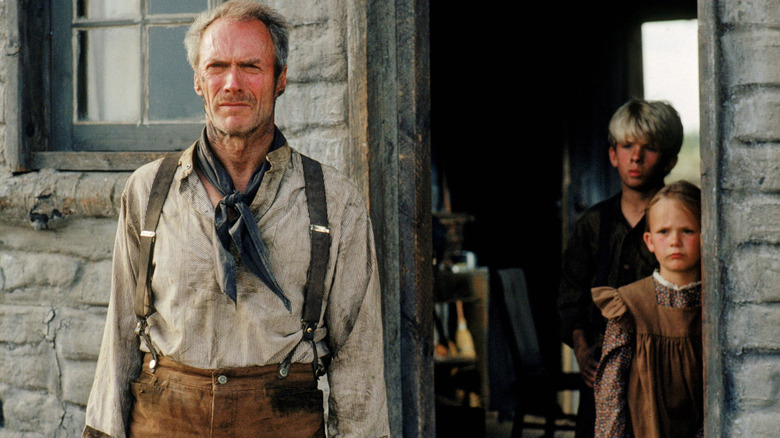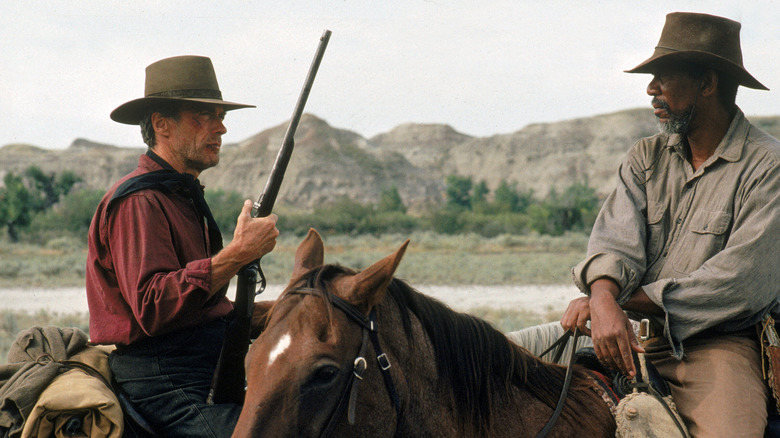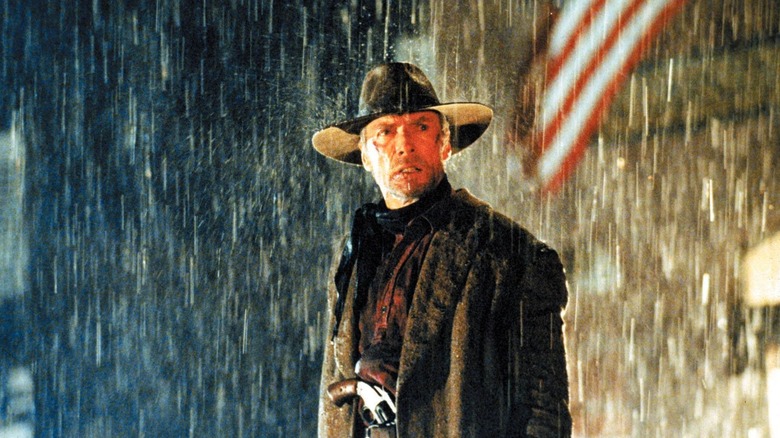This Iconic Clint Eastwood Western Is A Spiritual Sequel To His Best Role
Are you a "Dirty Harry" fan or more of a Man With No Name kind of person? Whichever your preference, there's little doubt both are iconic characters in Clint Eastwood's filmography. I personally lean more towards the latter, although his laconic stranger in Sergio Leone's "Dollars Trilogy" is more of a vibe than a three-dimensional character. He's barely two-dimensional — I mean, what do we know about him that the cool moniker doesn't already tell us? He loves rocking a poncho and prefers long, thin cheroots to cigarettes or pipes. He saves his right hand for shooting (in "For a Few Dollars More," at least), and briefly mentions he's from Illinois in "The Good, the Bad and the Ugly." That's about as much of a backstory as we get. We don't even get much of an indication what is going on behind that famous squint. As Sergio Leone said of Eastwood's acting style, he had two expressions: With hat and no hat.
The Man With No Name is an enigma, a blank, and what makes him so memorable is simply the sheer star power of Eastwood's screen presence as his sharp-shooting force of retribution blows through those three movies. Even the term "Man With No Name" is vague, cooked up after the fact by United Artists as a marketing ploy for the films' Stateside release. For Leone and Eastwood, he was variously known by three nicknames: Joe, Manco, and Blondie, respectively. And all that is totally fine – the role made Eastwood one of the best Western movie actors ever, and we don't need a detailed bio for him. (I'd hate it if anyone did a "Dollars" prequel and revealed that "Manco" was actually the name of his beloved pet iguana as a kid or something stupid like that.)
Although Eastwood's landmark spaghetti westerns with Leone are regarded with classics now, the "Dollars Trilogy" was poorly received by some critics who took issue with the violence. Pauline Kael wasn't a big fan; she loved bashing Eastwood's films for being too macho, dumb, and violent. She at least was half-right about the violence thing: There is little denying that Clint Eastwood built his career playing violent men. As he matured as a filmmaker, however, he would eventually reckon with his ruthless Western legacy in "Unforgiven." In many ways, that Oscar-winning film was a spiritual sequel to his star-making turns in the "Dollars" movies.
So what happens in Unforgiven?
"Unforgiven" takes us back to Big Whiskey, Wyoming, in 1880, where where a drunken cowboy maims sex worker Delilah Fitzgerald (Anna Thomson) by taking a knife to her face. The town's sheriff, Little Bill Daggett (Gene Hackman) lets the attacker and his friend off with a fine. Delilah's friends are furious about the lack of justice and pool their earnings to offer a $1000 bounty to anyone who will take the cowboys down.
We also meet William Munny (Clint Eastwood), once a notorious gunslinger who is now scratching out a living as a widowed pig farmer with two young children. His wife helped him kick the booze and renounce his evil old ways, but the bounty proves too tempting when he is approached to partner up by the Schofield Kid (Jamiz Woolvett), a boastful young man who claims to be a ruthless killer. Now severely out of practice, Munny decides to take along his old partner Ned Logan (Morgan Freeman) for backup.
Meanwhile, back in Big Whiskey, a self-aggrandizing British gunfighter known as English Bob (Richard Harris) arrives with his biographer W.W. Beauchamp (Saul Rubinek) to seek the prize. Bob ignores the town's no gun policy and incurs the wrath of Little Bill, who brutally beats him to ward off any other potential assassins. Munny receives similar treatment when his small posse rides in. Not to be dissuaded, they track down their targets until Logan loses his nerve, leaving Munny and the Kid to finish the job. But Logan is captured and whipped to death by Little Bill, setting up a final showdown between the aging former killer and the sadistic sheriff.
Eastwood regarded "Unforgiven" as a chance to take a more realistic approach to the classic Western format and also deliver a strong message. He told AFI:
"I wanted to make a statement that the western was based upon myth and created by characters who exaggerated the myth of it all. But I also wanted to make a statement that was pertinent to today's society as to the [...] romanticism of gunplay and violence."
Clint Eastwood is one of Hollywood's least flashy directors, and his no-nonsense style is the perfect fit for the somber tone of "Unforgiven." The Academy thought so, too. Finally getting his due as a filmmaker and an actor, Eastwood received his first Oscar (Best Picture) and two more nods for Best Director and Best Actor.
How exactly does Unforgiven relate to the Dollars Trilogy?
There are quite a few theories online that William Munny is the Man With No Name in his later years. The timeline fits, but that is perhaps taking Eastwood's goal in "Unforgiven" too literally. Munny is clearly a man haunted by his past as a cold-blooded killer, a former hard-drinking villain liable to shoot someone out of plain meanness, and who caused the deaths of women and children. That doesn't exactly fit the description of the laconic gunslinger we see in the "Dollars Trilogy," who is wry and calm when dispatching his opponents and clearly has a soft spot for kids.
"Unforgiven" is more of a spiritual sequel to those movies, a rumination on the neat and apparently consequence-free killings of the character that made Eastwood a star. He shot dead 41 snarling baddies over the course of three films (according to All Outta Bubblegum), and you rarely got the sense that they were anybody who would be missed. You also got the sense that the Man With No Name wouldn't lose any sleep over them.
With "Unforgiven," Eastwood answered all the critics who previously decried the violence in his movies in his usual forthright way. Here he shows how gun violence is nasty and messy and killing always has deep repercussions, including for the person doing the killing. This point is underlined by Munny's tortured memories of his past deeds and perhaps the film's key quote: "It's a hell of a thing, killing a man. Take away all he's got and all he's gonna have."
On another level, "Unforgiven" itself shows Wild West myth-making in action. Munny's fearsome reputation has crossed state boundaries and the Kid lies about his own kill count, while English Bob's exploits are hugely exaggerated by his biographer. Even the extent of Delilah's injuries is ghoulishly overstated as news of the bounty spreads. Once English Bob has been sent packing (even his posh accent is a lie), Little Bill keeps Beauchamp around to write an account of his own deeds. By de-glamorizing the violence inherent in Western movies and de-mythologizing the American Frontier, Eastwood signed off from the genre with a powerful eulogy that echoes "The Man Who Shot Liberty Valance," John Ford and John Wayne's final western together from 30 years earlier. Another three decades later, "Unforgiven" remains Eastwood's masterpiece.


